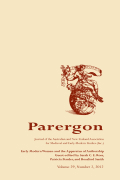
PARERGON
Scope & Guideline
Engaging Scholars in Critical Analysis and Discourse
Introduction
Aims and Scopes
- Interdisciplinary Research:
The journal encourages contributions that bridge various disciplines such as history, literature, art history, and cultural studies, enhancing the understanding of medieval and early modern societies. - Cultural and Social Dynamics:
A significant focus is on the cultural exchanges and social dynamics within and between communities during the medieval and early modern periods, including the influences of religion, gender, and power structures. - Historical Narratives:
The exploration of historical narratives, including chronicles, literary works, and artistic representations, is a core theme, allowing for a comprehensive understanding of how history is constructed and represented. - Material Culture:
The journal emphasizes the study of material culture, examining artifacts, manuscripts, and visual art as essential elements for understanding historical contexts and societal values. - Gender Studies:
A consistent focus on gender studies is evident, exploring the roles and representations of women and men in historical texts, art, and social structures.
Trending and Emerging
- Transnational Perspectives:
Recent publications increasingly adopt transnational perspectives, examining the interconnectedness of cultures and societies across geographical boundaries, which is crucial for understanding historical developments. - Exploration of Emotions and Affect:
There is a growing trend towards exploring emotions and affect in historical contexts, reflecting a broader interest in how feelings shape human experiences and societal structures. - Environmental Histories:
Emerging themes include environmental histories, which analyze the interactions between societies and their environments, emphasizing sustainability and ecological perspectives in historical narratives. - Digital Humanities Approaches:
The incorporation of digital humanities methodologies is on the rise, facilitating innovative ways to analyze texts, visualize data, and engage with historical materials. - Critical Race Studies:
An increasing focus on critical race studies is evident, as scholars examine the complexities of race and ethnicity in historical contexts, contributing to a more inclusive understanding of medieval and early modern societies.
Declining or Waning
- Traditional Historical Narratives:
There appears to be a waning interest in traditional historical narratives that solely focus on political events and figures, as contemporary scholarship increasingly prioritizes social history and cultural contexts. - Single-Dimensional Gender Studies:
Research that approaches gender from a singular, binary perspective has declined, giving way to more nuanced discussions that incorporate intersectionality and broader societal impacts. - Static Views of Medievalism:
The exploration of medievalism as a static concept is decreasing, with fewer publications focused solely on medieval influences in contemporary culture, as the field shifts towards dynamic, multifaceted interpretations. - Overly Scholarly Approaches:
There is a noticeable decrease in publications that adopt overly scholarly or inaccessible methodologies, as authors aim to engage a broader audience with more accessible writing styles.
Similar Journals

Magnificat Cultura i Literatura Medievals
Celebrating the Legacy of Medieval LiteratureMagnificat Cultura i Literatura Medievals, published by UNIV VALENCIA, SERVICIO PUBLICACIONS, is an esteemed academic journal that has been at the forefront of medieval studies since its inception in 2014. With its Open Access model, this journal ensures that cutting-edge research is readily available to scholars and enthusiasts alike, fostering an inclusive academic environment. Based in Spain, it boasts impressive rankings with a Q2 designation in History and a Q1 in Literature and Literary Theory for 2023, indicating its significant contribution to these fields. The journal is indexed by Scopus, achieving top-tier rankings in both Literature and History, and is recognized in the 87th and 72nd percentiles of their respective categories. With a focus on the complexities of medieval culture and literature, Magnificat serves as a vital resource for researchers, professionals, and students dedicated to exploring the rich tapestry of medieval scholarship.
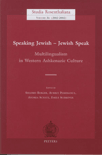
STUDIA ROSENTHALIANA
Delving into the Intersections of Culture and HistorySTUDIA ROSENTHALIANA is a distinguished journal published by Amsterdam University Press, specializing in the interdisciplinary study of Jewish culture and history, particularly as it relates to the field of Rosenthaliana, encompassing literature, art, and historical scholarship. With a robust academic legacy dating back to its inception in 1970, the journal has evolved through various publication phases, maintaining a commitment to fostering scholarly discourse and disseminating significant research. Although it does not currently participate in an open access model, STUDIA ROSENTHALIANA continues to contribute invaluable insights to the fields of Jewish studies, cultural analysis, and historical research. Researchers, professionals, and students can benefit from its comprehensive essays, critical reviews, and analytical studies that enrich our understanding of Jewish heritage and modern implications. The journal's influence and relevance in its field make it an essential resource for anyone invested in contemporary debates and analyses concerning Jewish culture and identity.
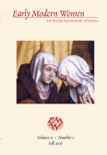
Early Modern Women-An Interdisciplinary Journal
Fostering Interdisciplinary Dialogue on Gender DynamicsEarly Modern Women: An Interdisciplinary Journal, published by the University of Chicago Press, serves as a vital platform for exploring the diverse experiences and contributions of women during the early modern period. With an ISSN of 1933-0065 and an E-ISSN of 2378-4776, this journal aims to enrich the discourse in gender studies by presenting interdisciplinary research that spans literature, history, and cultural studies. Although currently categorized in the Q4 quartile within Gender Studies and ranking in the 5th percentile, it plays an essential role in nurturing upcoming scholarship in a field marked by ongoing exploration and debate. Aimed at researchers, professionals, and students alike, the journal not only provides critical insights but also fosters dialogue about gender dynamics in historical contexts. By focusing on the convergence of scholarly efforts from 2010 to 2011 and 2015 to 2024, the journal ensures a comprehensive examination of its evolving scope, inviting contributions that will shape understanding of women's roles in early modern societies.

Perspectives Medievales-Revue d'epistemologie des Langues et Litteratures du Moyen Age
Connecting Scholars to the Heart of Medieval InquiryPerspectives Medievales-Revue d'epistemologie des Langues et Litteratures du Moyen Age is a distinguished academic journal dedicated to the exploration and analysis of medieval languages and literatures, providing a unique platform for interdisciplinary scholarship. Published by SOC LANGUE & LITTERATURE MEDIEVALES OC & OIL, this Open Access journal has been committed to advancing research and knowledge dissemination since 2009. It serves as a vital resource for researchers, professionals, and students interested in the complexities of medieval textuality and linguistics, encouraging innovative perspectives and critical dialogues within the field. With its broad scope encompassing various aspects of medieval studies, the journal aims to stimulate scholarly discussion and inspire future research endeavors. Located in Paris, France, Perspectives Medievales plays a crucial role in promoting the understanding and appreciation of medieval studies on a global scale, contributing to the rich tapestry of humanistic inquiry.

Listy Filologicke
Exploring the Intersections of History, Language, and Literature.Listy Filologicke is a distinguished academic journal published by the Institute of Classical Studies at the Academy of Sciences of the Czech Republic, focusing on the interdisciplinary fields of History, Linguistics and Language, and Literature and Literary Theory. With an ISSN of 0024-4457 and an E-ISSN of 2570-9410, this journal has been a pivotal platform for scholarly discourse since its convergence years began in 2003. Notably, it holds a Q3 classification in History and Linguistics and Language, and a Q2 in Literature and Literary Theory as of 2023. Its rankings within Scopus illustrate its relevance and impact in academia, with noteworthy positions in the Arts and Humanities and Social Sciences categories. Researchers, professionals, and students will find Listy Filologicke an invaluable resource for exploring cutting-edge research, critical analyses, and discourse that contribute significantly to their respective fields. Based in the heart of the Czech Republic, it continues to promote scholarly excellence and foster international collaboration.
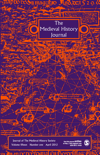
MEDIEVAL HISTORY JOURNAL
Diving into the Rich Tapestry of Medieval LifeWelcome to the MEDIEVAL HISTORY JOURNAL, a prominent academic platform published by SAGE PUBLICATIONS INC, dedicated to advancing the field of medieval studies. Since its inception in 1998, this journal has established itself as a vital source of scholarly discourse, offering a rich array of articles that cover various aspects of medieval history, from cultural and societal developments to the intricate interplay of politics and religion. With an impressive rank of #568 out of 1760 in the Scopus Arts and Humanities History category and a respectable 67th percentile, the journal exemplifies rigorous academic standards and impactful research. Although it operates primarily under subscription access, its contributions are indispensable for researchers, professionals, and students seeking to deepen their understanding of the medieval era. The journal's ongoing commitment to publishing cutting-edge research makes it a cornerstone for anyone passionate about exploring the complexities of medieval history.
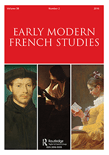
Early Modern French Studies
Challenging Narratives, Enriching ScholarshipEarly Modern French Studies (ISSN: 2056-3035; E-ISSN: 2056-3043), published by Routledge Journals, Taylor & Francis Ltd, is an essential academic journal that delves into the complexities of early modern French culture, literature, and history. With a focus on interdisciplinary approaches, this journal offers scholars a platform to engage with the evolving dynamics of French studies from 2015 to 2024. Despite its current Q4 ranking in the categories of Cultural Studies, History, and Literature and Literary Theory, Early Modern French Studies seeks to elevate discussions and research that illuminate the richness of the early modern period. While offering traditional subscription options, the journal encourages submissions that challenge prevailing narratives and foster innovative dialogues within the field. This journal is crucial for anyone looking to contribute to or gain insights into the intricate tapestry of early modern French scholarship.
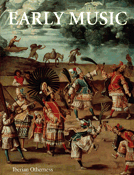
EARLY MUSIC
Fostering Dialogue on Early Musical PracticesEARLY MUSIC, published by Oxford University Press, is a distinguished journal that has been instrumental in advancing research and scholarship in the field of early music since its inception in 1973. With an ISSN of 0306-1078 and an E-ISSN of 1741-7260, this journal caters to academics and professionals whose work intersects with historical musicology, performance practice, and music theory up to the 18th century. Although it currently resides in the Q3 quartile for Music in the Scopus rankings, its commitment to disseminating cutting-edge research positions it as a critical resource for those interested in the nuances of early musical traditions. The journal provides an important platform for interdisciplinary dialogue, contributing to its rank of #149 out of 180 in Arts and Humanities Music, with a modest 17th percentile grouping that signifies emerging growth and influence. With a rich repository of articles and studies published annually, EARLY MUSIC continues to inspire and inform the next generation of music scholars and practitioners, reinforcing the vital role of historical understanding in contemporary music practice.
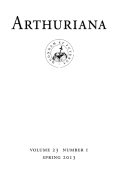
Arthuriana
Advancing the Discourse: A Multidisciplinary Approach to Arthurian StudiesArthuriana is a distinguished journal published by Scriptorium Press, focusing on the rich tapestry of Arthurian studies through a multidisciplinary lens encompassing history, literature, and literary theory. With an ISSN of 1078-6279 and an E-ISSN of 1934-1539, the journal has garnered a commendable reputation, demonstrated by its Category Quartiles ranking—Q2 in History and Q1 in Literature and Literary Theory as of 2023. Covering the period from 2002 to 2024, Arthuriana serves as an essential platform for scholars, offering insights and discourse that enrich our understanding of Arthurian narratives and their cultural significance. Despite its absence of Open Access, it remains vital within the academic community, appealing to researchers, professionals, and students who seek to explore the complexities of this timeless subject. With a Scopus rank of #373 in Literature and Literary Theory and #876 in History, Arthuriana is an indispensable resource for those at the forefront of Arthurian scholarship.

Tiempos Modernos-Revista Electronica de Historia Moderna
Disseminating knowledge, redefining historical perspectives.Tiempos Modernos - Revista Electronica de Historia Moderna is a leading open-access journal dedicated to the exploration and analysis of modern historical narratives, critical scholarship, and interdisciplinary approaches. Published by ASOC MUNDOS MODERNOS, this esteemed journal has been a vital resource for researchers, professionals, and students in the field of modern history since its inception in 2000. With its ISSN 1699-7778 and E-ISSN also 1699-7778, the journal aims to foster the dissemination of contemporary academic work and dialogues that shape our understanding of modern historical contexts. Embed your research within the broader scholarly conversation through this platform, and benefit from its commitment to open access, making academic achievements widely accessible and impactful. Located in Madrid, Spain, Tiempos Modernos stands out within the historical community by promoting innovative research and enhancing the visibility of modern historical studies.